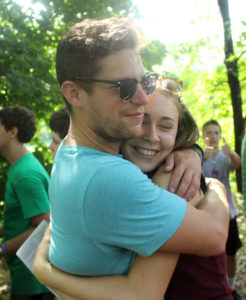by Sarah Lauing, Associate Director
 On Shavuot, we read the Book of Ruth, about a young non-Jewish woman who ties her fate to her mother-in-law. Ruth famously states, “Where you go I will go, your home will be my home, your people my people, and your God my God” (Ruth 1:16). As we begin to welcome our first waves of staff to camp to begin our season, I am struck by how many of them are taking a similar leap of faith. Our director team travels all over the world to find the best staff for camp, from the U.K. to Eastern Europe to Israel. In each country, after each Skype interview, these new staff members simply say: Yes! I’ll come to your American Reform Jewish summer camp! Some have never been to America, some have never experienced Reform Judaism, and some, like Ruth, are not Jewish at all. And yet they make the journey to West Stockbridge to live by our mission and values and to join our community for the summer months.
On Shavuot, we read the Book of Ruth, about a young non-Jewish woman who ties her fate to her mother-in-law. Ruth famously states, “Where you go I will go, your home will be my home, your people my people, and your God my God” (Ruth 1:16). As we begin to welcome our first waves of staff to camp to begin our season, I am struck by how many of them are taking a similar leap of faith. Our director team travels all over the world to find the best staff for camp, from the U.K. to Eastern Europe to Israel. In each country, after each Skype interview, these new staff members simply say: Yes! I’ll come to your American Reform Jewish summer camp! Some have never been to America, some have never experienced Reform Judaism, and some, like Ruth, are not Jewish at all. And yet they make the journey to West Stockbridge to live by our mission and values and to join our community for the summer months.
What drives Ruth to make this commitment? Commentators highlight the value of chesed (kindness) that pervades the story of Ruth. Scholars cite many examples of kindness in the story, including Ruth’s refusal to abandon her mother-in-law, as well as Boaz the landowner allowing Ruth to glean barley in his fields. Chesed is often translated as loving-kindness, to indicate kindness motivated by love and compassion. Ruth is motivated by her love for her mother-in-law, which leads to her acts of kindness.
 This summer at Crane Lake we’ll be highlighting the value of chesed through our theme: A Culture of Kindness. Kindness is a cornerstone of Crane Lake, from the way we treat each other in the bunks to the way we welcome our incredibly diverse staff and camper community. Kindness at Crane Lake is more than kindness; it’s chesed. It is a kindness motivated by a deep sense of love for this place, its people, and our mission. It is a kindness that inspires action, from small acts of compassion to large movements of social action.
This summer at Crane Lake we’ll be highlighting the value of chesed through our theme: A Culture of Kindness. Kindness is a cornerstone of Crane Lake, from the way we treat each other in the bunks to the way we welcome our incredibly diverse staff and camper community. Kindness at Crane Lake is more than kindness; it’s chesed. It is a kindness motivated by a deep sense of love for this place, its people, and our mission. It is a kindness that inspires action, from small acts of compassion to large movements of social action.
In a midrash, Rav Ze’ira states, “Why was [the Book of Ruth] written? To teach how great is the reward of those who do deeds of kindness” (Ruth Rabbah 2.14). Why do our staff commit to Crane Lake summer after summer? I think they see the reward that comes with living within a culture of kindness. By going where we go, by making our home their home, staff and campers come away from camp with a strengthened sense of community and responsibility that will help them live chesed for the rest of their lives.
